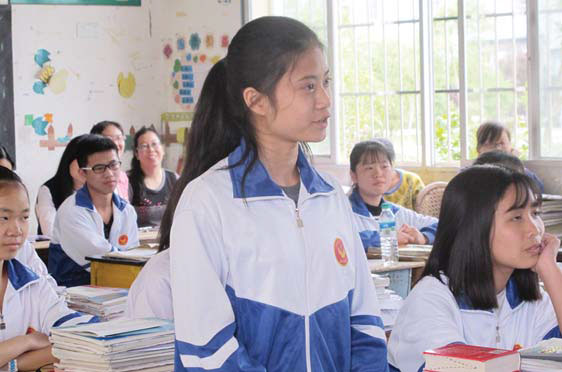Rural students dare to dream
Liu Qianyi wants to be an engineer, Jiang Ruifang aspires to be a writer, and Chen Yan hopes to work as a translator.
These 16-year-olds at Huichang Zhulan Demonstration School, which opened in 2007, are better equipped than most rural Chinese students to realize their dreams.
It is all thanks to the school's experimental approach, which blends basic education with vocational skills in agricultural sciences and food processing, the pillar industries in Jiangxi province's Huichang county, where roughly one in 10 residents live below the national poverty line.
|
A student of Zhulan's vocational school answers her teacher's question. |
"We're a pilot school for rural reform. It's a new idea for running a school," principal He Fasheng says.
Vocational majors include computer sciences, food processing, biomedicine and crop cultivation.
Thirty-three graduates from Zhulan's vocational school have enrolled in university since 2013. "Some have returned home," says Zeng Wenliang, the school's vice-principal.
Currently, 174 teachers instruct 2,428 students from preschool through high school. About 100 adults also take vocational classes.
The school is the brainchild of elderly philanthropist Li Yonghai, who provides four-fifths - 40 million yuan ($6.09 million; 5.37 million euros) - of its budget. Most of the rest comes from the government. Smaller donations also come from enterprises and local farmers, who chip in 50 or 100 yuan a time.
A statue near the campus entrance of two hands reaching toward the sky inscribed with the words "Full of love beneath heaven" commemorates all those who have donated.
"Farmers welcome and support our school," He says. "We must remember their names and contributions."
Villagers donate because they recognize the importance of agricultural advancements, according to employees at the school. "We're a rural school, so students should learn farming," says vice-principal Chen Suzhen. "Our fields are training bases."
Students study the cultivation of crops such as oranges and passion fruit, and produce rice noodles and dried tofu, locally processed foodstuffs. They grow the produce that is served in the canteen. Any surplus is sold by the teachers, with profits helping to fund the school.
Passion fruit, which sells for 30 yuan a kilogram, is grown in a 0.5-hectare greenhouse.
Biomedicine majors also tend a 2-hectare herb field, and students also pitch in at the 6.7-hectare orange orchard, which has 3,800 trees, and a pig farm with 250 animals.
Financial woes forced the sale of 550 pigs last year. Citrus greening disease also meant many orange trees had to be chopped down. The surviving trees have fewer blossoms than usual this year.
The orchard serves as a practice base for students, and a demonstration zone to test new varieties and teach local farmers better cultivation techniques. Tangelos from nearby Fujian province were also recently introduced.
"Previously, only elderly residents stayed in Huichang. Younger people migrated," says Zeng. "That's partly because local enterprises weren't efficient. But that was in turn because of poor human resources."
The school hopes to break this cycle. "Graduates need work, and industry needs workers," he adds. "We need to link businesses to vocational schools."
Increased cooperation with local enterprises in the food and service industries is one approach the school is taking. Another is applying to offer e-commerce as a major, as the sector is flourishing in the county. Most of the school's oranges were sold online last year. It also sells passion fruit on peer-to-peer platforms.
However, some students' dreams are even more ambitious. Liu Qi, in ninth grade, wants to teach English. "English is useful," she says.
Her classmate, Xiao Quanzhou, wants to work with mathematics. "I want to go to university in Nanchang, where my brother studies," he says.
And 18-year-old vocational student Liu Juan hopes to work in information technology in Shenzhen, Guangdong province.
"It offers more opportunities to develop," he says. "Then I can return and enjoy a career in Huichang."
erik_nilsson@chinadaily.com.cn



















